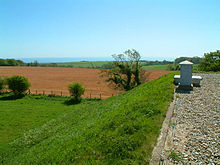| Site of Special Scientific Interest | |
 | |
| Location | Kent |
|---|---|
| Grid reference | TR 192 384[1] |
| Interest | Biological Geological |
| Area | 263.2 hectares (650 acres)[1] |
| Notification | 1985[1] |
| Location map | Magic Map |
Folkestone to Etchinghill Escarpment is a 263.2-hectare (650-acre) biological and geological Site of Special Scientific Interest on the northern outskirts of Folkestone in Kent.[1][2] It is a Special Area of Conservation.[3] An area of 205 hectares (510 acres) is a Nature Conservation Review grassland site, Grade 2, and the 70-hectare (170-acre) Asholt Wood at its western end is a Grade 1 woodland site.[4] The reserve has a Geological Conservation Review site.[5][6]
A large area of chalk grassland has three nationally rare plants, and Asholt Wood has outstanding lichen flora. The site also includes Holywell Coombe, a key geological site displaying the sequence of mollusc fossils in the late Pleistocene and Holocene.[7]
- ^ a b c d "Designated Sites View: Folkestone to Etchinghill Escarpment". Sites of Special Scientific Interest. Natural England. Retrieved 5 February 2018.
- ^ "Map of Folkestone to Etchinghill Escarpment". Sites of Special Scientific Interest. Natural England. Retrieved 5 February 2018.
- ^ "Designated Sites View: Folkestone to Etchinghill Escarpment". Special Area of Conservation. Natural England. Retrieved 16 January 2018.
- ^ Ratcliffe, Derek, ed. (1977). A Nature Conservation Review. Vol. 2. Cambridge, UK: Cambridge University Press. pp. 46, 119. ISBN 0521-21403-3.
- ^ "Holywell Coombe (Quaternary of South-East England)". Geological Conservation Review. Joint Nature Conservation Committee. Retrieved 11 January 2018.
- ^ "Holywell Coombe (Quaternary of South-East England)". Geological Conservation Review. Joint Nature Conservation Committee. Retrieved 11 January 2018.
- ^ "Folkestone to Etchinghill Escarpment citation" (PDF). Sites of Special Scientific Interest. Natural England. Retrieved 5 February 2018.